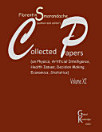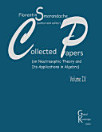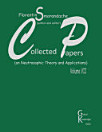Nidus Idearum. Scilogs, XVI: Weaving the neutrosophic web
About this ebook
This volume further explores the breadth of neutrosophic applications, from its use in defining new mathematical structures like neutrosophic triplet hypertopology and exploring neutro-algebraic and anti-algebraic structures, to its application in areas like medical diagnosis with complex neutrosophic similarity measures. We also delve into more theoretical aspects, such as completeness and incompleteness in neutrosophy, the division of quadruple neutrosophic numbers, and the refinement of neutrosophy in relation to lattices, pair structures, and YinYang bipolar fuzzy sets.
Beyond the core of neutrosophic theory, I reflect on a range of philosophical and societal questions. This includes discussions on dialectics, the concept of indeterminacy, the degree of democracy, the blending of capitalism and communism, and the principle of internal fragility in dynamic systems. We also explore the fascinating potential of the aging brain and the principle of interconvertibility of matter, energy, and information, touching upon consciousness and personality.
The Scilogs are not meant to provide definitive answers but rather to serve as a repository of ideas, questions, and intellectual provocations.
Exchanging ideas with Dan Florin Lazăr, Yaser Ahmad Alhasan, William H. Woodall, M. Karimi, M. R. Hooshmandasl, A. Shakiba, N. Zamani, Said Broumi, Saeid Jafari, Ronald Pinho, Robert Neil Boyd, Victor Christianto, Le Hoang Son, Luu Quoc Dat, Mumtaz Ali, Rafif Alhabib, Kalyan Mondal, Surapati Pramanik, Zhang Wenpeng, Ludi Jancy Jenifer, Peide Liu, Ganeshsree Selvachandran, Terman Frometa-Castillo, Mohammad Khoshnevisan, Maikel Leyva Vazquez, Akira Kanda, Andrușa Vătuiu, Octavian Blaga, Mustapha Kachchouh, Kawther Fawzi, Hamidreza Seiti, Ștefan Vlăduțescu (in the order they appear in the book).








